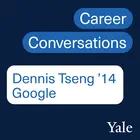
‘Career Conversations’ Podcast: Dennis Tseng ’14, Hiring Innovation at Google
Season 2, Episode 8: Dennis Tseng ’14, Hiring Innovation at Google, with Emily Kling ’21
Subscribe
Subscribe to Career Conversations on Apple Podcasts, Google Play, SoundCloud,Spotify, or your favorite podcast platform.
Dennis Tseng is a 2014 graduate of Yale SOM. He works as a Program Manager for Staffing Enablement in Google's Hiring Innovation department, helping the tech giant hire nearly 25,000 employees each year in a more effective and equitable way. He is interviewed by Emily Kling ’21.
The views and opinions expressed in this episode are of those of the participant and do not necessarily reflect those of their employer.
About Dennis Tseng
Dennis was born and raised in Silicon Valley and studied acting at NYU. Following graduation, he founded a nonprofit theater company while also working in the New York nonprofit scene. It was this combination of art and nonprofit management that ultimately led him to business school at Yale SOM.
In his own words, he “wanted to learn how the world actually worked, to learn how organizations work.” While he was at SOM, Dennis received the Paul & Daisy Soros Fellowship for New Americans—a national fellowship for first- and second-generation immigrants—and worked closely with MBA admissions to advance diversity and inclusion programming.
While at SOM he dove deep into organizational behavior disciplines, especially design thinking and innovation processes, which eventually led him to the design and innovation consultancy SYPartners, in San Francisco, where he advised the C-suites of Hyatt, Apple, Starbucks, and AARP on how to design aspirational futures and cultures for their companies.
Now at Google, Dennis works in the company’ Hiring Innovation department, helping the tech giant hire nearly 25,000 employees each year in a more effective and equitable way.
Excerpts
Dennis Tseng: (06:37) My journey to business school was also a pretty twisting one in and of itself. I think those seeds being sown into my nonprofit career, realizing, hey, if I want to make this theater thing workout, or if I want to be part of the change in making the entertainment industry more diverse and more inclusive and giving more seats at the table to people like me.
Dennis Tseng: (17:37) I'm in Hiring Innovation at Google, which is part of the larger strategy and operations arm of our staffing division. Google staffing division itself is several thousand people, which is the largest company I've ever worked for already, not to mention Google is now over 120,000 people. I've always worked for very small organizations, so it was a big change coming here. Now, what I've learned as a program manager is that can really mean anything at Google. It can mean herding cats, it can mean making sure that folks are abiding by timelines, it can mean creating lots and lots of dashboards and lots and lots of spreadsheets, but it can also mean storytelling. It can also mean influencing. It can also mean lots of change management and making sure that you understand an entire ecosystem so that when you are making one change upfront, you can think through the 10 different steps that are going to happen downstream.
Dennis Tseng: (15:09) Learning the principles of design thinking. It was a discipline that I had never heard of before. It got me really interested in, well, this is a part of organizational behavior. It's about teaching companies or organizations how to be creative, how to turn creativity into a process that creates new products, creates new services, creates new entire lines of business, or completely upsets existing sectors. It can think of different models, different ways of being. I loved that. As someone who dabbled in a lot of experimental theater, I was always looking for ways to upend expectations and to look at something from a very different lens. I think going into design thinking really resonated with me.
Dennis Tseng: (30:44) I think what companies can and should do today to really pay attention to achieving more equitable outcomes is to understand what roles implicit bias play in the hiring process. Whether it is interviewers or hiring managers or key decision makers. Those folks need to understand what their own implicit biases are, and they need to understand how to combat those biases or how to mitigate those biases. That's where we have to start. We have to start at the individual level within companies so that, as we change those minds, as we get folks to pay attention to what those individual biases are, we can eventually start achieving more equitable outcomes.
Listen
About Career Conversations
In this podcast series, SOM students sit down with alumni for a series of candid conversations about career paths, industries, opportunities for MBAs, and discussions on various career topics including work-life balance and creating a meaningful impact in business and society. This series is produced by and recorded at the Yale School of Management.
